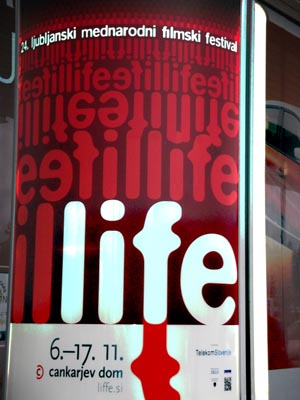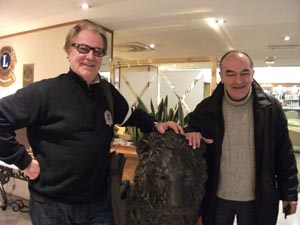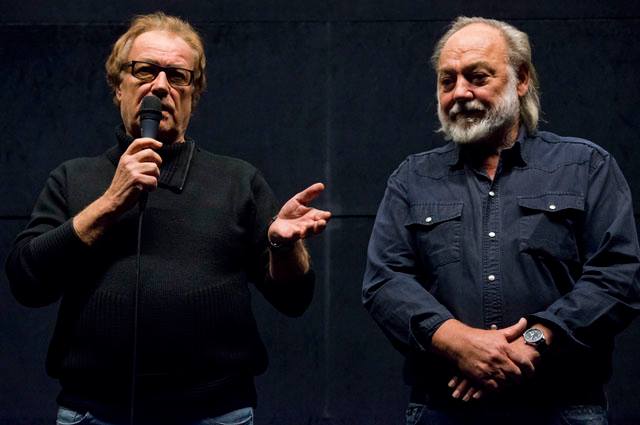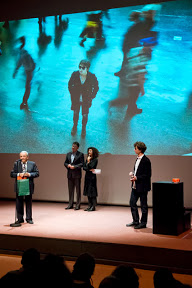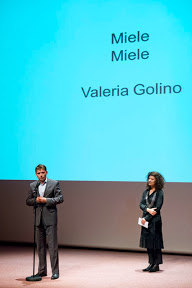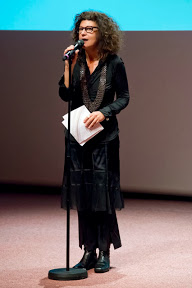Following the latest Retrospective of
Slovenian Film in March in Belgrade, Serbia, ever since the 70s, films coming from
Slovenia were representatives of the
Yugoslav black wave film or one way or another, film avant-garde. Slovenian
cinematography was and still is today somehow, closely related to a Serbian
cinematography, but without burden of present Serbian film-a post
civil themes. Slovenian film today may be overburden with social questions of a
coming liberal capitalism because the country is still adapting to a new social
system of being part of EC, yes, but in a way, it is still free of many bad
aspects of 90s. In the old Yugoslavia, the Slovenian filmmakers have had
their big chance to create great films in the legendary Studio Neoplanta based
in Novi Sad in Serbia. For
instance, Slovenian group of influential filmmakers from 70s and 80s called OHO
Group, and Slovenian most influential filmmaker of that period Karpo
Aćimović Godina. Neoplanta Production at that time
produced filmmakers like Križnar from OHO Group or Franci Slak while Karpo’s
most famous feature film Splav meduza (Medusa Raft)
www.imdb.com/title/tt0081549
with Serbian actress Vladica
Milosavljević from 1980 is
even today accepted by the various public as a representative film of early 80s
avant-garde dada and postmodernism on the big screen in ex Yugoslavia.
However, Karpo Godina was a filmmaker banned from communist socialistic Yugoslav
establishment and film industry due to a liberal and ideology free ideas
presented in his films. His early experimental film from 70s Gratinirani
mozak Pupilije Ferkeverk (Pupilije Ferkeverk’s Gratinating
Brains) was
www.imdb.com/title/tt0241497
banned from communist cinemas due to a
wrong message to a young people of communist society of I quote "supporting consumption
of LSD". Also documentary film Zdravi ljudi za razonodu (Healthy People
for Fun)
www.imdb.com/title/tt0313815
that talks about coexistence of different
minorities in Vojvodina (territory of Serbia) in 70s with the great irony,
escorted with ironic music in sub context that at that time, in socialist
country, raised numerous unsolved political issues in old Yougoslavia. The film
was banned due to, as the authority explained, "under the beautiful exterior
the film carries the most subervisive hidden message”
Today it is entirely different. Nowadays,
Slovenian cinematography lives a different life. Slovenia still
has small but serious cinema lounge cinematography and the national film
festival in Portorož and several outstanding film directors. The history of
Slovenian film seems to be more complicated than the history of other
ex-Yugoslav cinematography. History of film in small countries is viewed from
the perspective of authorial politics of genre or orientation within the minor
works; with the more distinctive differences than similarities in the
ideological and aesthetic sense. Slovenian film may always be special and it is
an interesting combination between distinctive aesthetics and industry and of
course, between ideology and art. Following the opinion of Jurij Meden
programmer of the Slovenian Film Archive in Ljubljana, old Slovenian directors like Karpo Godina or
perhapce Franci Slak can easily say they were great writers; while some of them
became postmodern symbol on film, in terms of relations with Slovenia's film
history and experimental forms of film that preceded the modern Slovenian
cinema. In old Yugoslavia, there were brilliant
experimental films at the beginning of filmmaker’s career, because all filmmakers from that
period started from experimental film and that was the case with other
cinematography in all ex communist countries as well. Thanks to that,
Slovenia today has a tradition of
experimental film, which is usually called an amateur film. This great success
of the rich tradition of video art and experimental film in Slovenia today
links many contemporary Slovenian filmmakers to a short film, which is healthy way to make a potential and not too expensive masterpiece.
Besides
the 'official' production, financed by the Film Center in Slovenia there are a
number of independent young authors and I will mention just a few authors in
this article, of course there are many more to come. For instance, Martin Turk,
one of the jurists of Ljubljana Film Festival 2009 is a film director from
Ljubljana Film Academy
who opted only for a short film and has received several international awards at
Cannes, Los
Angeles, Sydney, Aspen, Stockholm etc by
now. His latest film Stvari, ki jih nisva nikoli
naredila (Things We Never Done Together) achieved to the Sarajevo Film Festival.
Contemporary Subversive Slovenian Film
Can nowadays-contemporary
Slovenian film authors be subversive? The times are different. There are no strict
and edgy communist rules and censorships like in 70s. Everything is free (and nothing is free) and
apparently available. I would mention another Slovenian modern film director,
not known to a great public. Vlada Škafar is a self-taught filmmaker and by the
opinion of Jurij Meden from Slovenian Film Archive, for some time most
interesting and most innovating Slovenian film director who actually worked in
Slovenian Film Archive as programmer in 90s. Vlada Škafar was also one of the
first directors of another interesting Slovenian film festival-Kino Otok Izola.
He would be a contemporary author; whose films are the same kind of poetic
tenderness once celebrated
with Matjaž Klopčič in old Slovenia from a period of ex Yugoslavia. He is subversive in particular in
relation to the dominant system of film and his personal understanding of art:
if the poetry-means a spiritual work that sense
beauty as barely durable beginning of terrible (Rilke) – in present day, the
understanding of beauty as something pleasant is subversive,” Škafar explained. His previous film
(Father) made room for
the following works, which are in postproduction right now, Deklica in drevo
(A Girl and a Tree)and the film called Mama (Mother).
Intuition and film
When it
comes to Slovenian cinema I would of course mention Jan Cvitkovič, the most sucessful Slovenian director
by now. In waiting for
revival of small and independent cinema, intuition and feeling is very important
for filmmakers. It is hard to talk about the possibility of re-rebirth of cinema
in such time of great insecurity, because there is so little factor in the
process of "rebirth" that is too involved: a complete private creative
enthusiasm appropriate solution to finance films will not be possible to predict
with certainty. Slovenia
became a full member of European co-production fund Euroimages 2001 that same
year when Jan
Cvitkovič for the film
Kruh i mliko (Milk and Bread)won the Golden Lion in Venice. However, speaking
of intuition
Cvitkovič is as Škafar, a
self-taught film director and an archaeologist by profession who relies on his
own feeling and intuition. Although it is Kruh i mliko (Milk and Bread)
that made him an important prize, lately his films are different. A new film by
Cvitkovič Arheo (Archeo) is a love story that talks about
the need for security, passion and love," and it is his new experimentation with
subconscious.
More about this film, you can read in
another article The Men Who Fell to Earth.



















